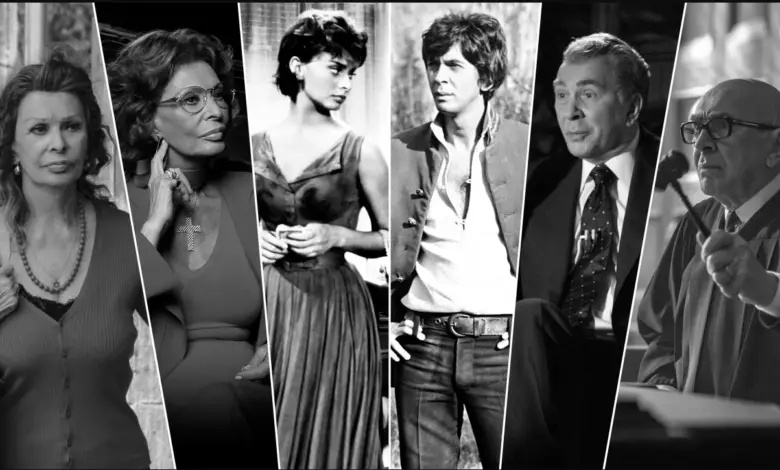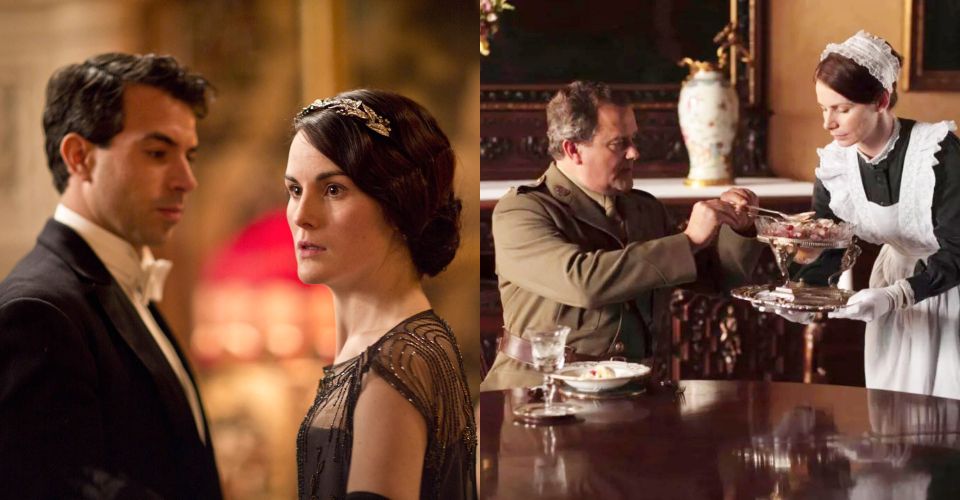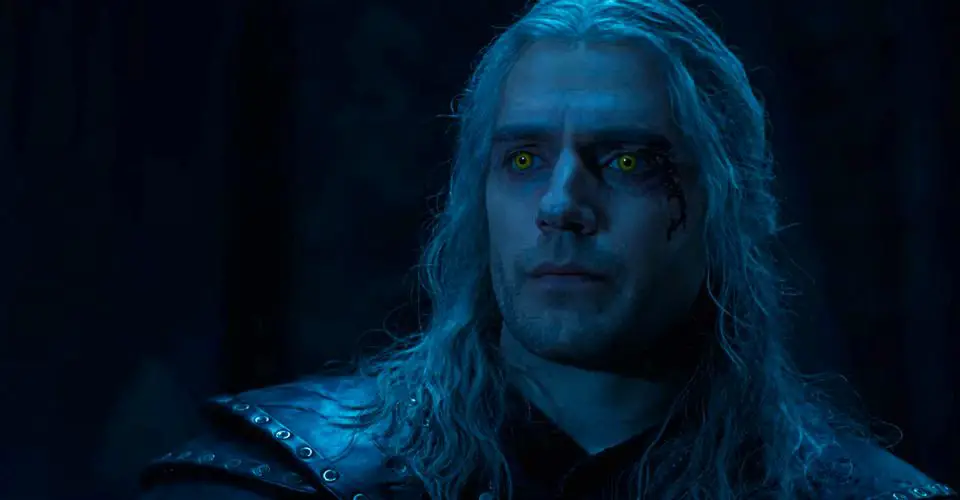In Conversation: Sophia Loren And Frank Langella, Two Titans Of Screen And Stage, Look Back On Their Predestined Drive To Perform

When Netflix suggested I might like to preside over a conversation between Sophia Loren and Frank Langella, two titans of the screen and stage, it felt churlish to turn the opportunity down. They both appear in films handled by the streamer this year; Loren makes her return to screens after more than a decade away in The Life Ahead, directed by her son Edoardo Ponti, and Frank Langella delivers a blistering turn as Judge Julius Hoffman in Aaron Sorkin’s The Trial of the Chicago 7.
And what to say about two of the most accomplished actors of their generation that hasn’t been better spoken by the many decades of extraordinary work both of them have authored?
Frank Langella, of course, made his name in the theater, where he has won no fewer than four Tony Awards for performances in plays by Peter Morgan, Florian Zeller, Edward Albee and Ivan Turgenev. He has brought some of those plays to the screen, notably reprising the roles of Dracula and Richard Nixon in cinema adaptations—make of the connection between those two characters what you will. He was also Oscar-nominated for his role in Frost/Nixon, and he brings pathos and presence to every part.
Sophia Loren, meanwhile, has been an icon of cinema since she emerged as one of the Italian industry’s most adored stars before she even celebrated her 20th birthday. She conquered Hollywood in its Golden Age, starring in films like The Black Orchid and Houseboat. And yet she never lost sight of her Italian roots, enjoying enduring collaborations with Vittorio De Sica and Marcello Mastroianni, and winning an Oscar for her performance in De Sica’s Two Women. It’s 30 years since the Academy presented Loren with an honorary Oscar in celebration of a truly indelible body of work, and yet, as she’ll playfully scold me before our time is through, retirement is still not a word in her vocabulary.
So, with any pretense of journalistic objectivity thrown far out of the window, what follows is two proud Italians reflecting on life and art, while another—me—tried to stay out of the way.
SOPHIA LOREN: There was war. There was war every night. It was impossible to live. You never knew whether you were going to wake up in the morning. All the lights were off in the streets, and we were under the covers because they were bombing every night. Life was really very bad.
And more than that, my sister, whenever she heard the sirens coming, instead of getting dressed she would take off all her clothes and it was a disaster. At that time, we were children, so all night and early into the morning we’d be laughing about my sister really not wanting to go [to the shelters] and taking off all her clothes.
But anyway, here we are. My sister is with me now, she’s fine, and I am OK also [laughs].

DEADLINE: What did the movies mean to you at that time? Your mother was very encouraging of your career and very excited by the idea of you building a life as an actress. Did she introduce cinema to you?
LOREN: If I am an actress, it’s because I wanted to be an actress. My mother never thought that being an actress was something that, if she had my age, she could do. Because of the bombing, because of the war, of course. But it was something that was inside of me since the beginning, when I was watching films, watching Rita Hayworth, watching the great stars from America. It was my dream.
Only then, when I was coming out of the cinema, and only then a little bit, I felt, not more secure, but maybe I had a feeling that one day it might happen for me to be an actress. I was just dreaming, dreaming, dreaming, dreaming.
DEADLINE: Frank, you grew up on the other side of the world, in Bayonne, New Jersey. What was your early life, and how did acting find you?
FRANK LANGELLA: It was the relatively normal life of a young boy during the war. I didn’t know anything of the remarkable tragedies that Sophia grew up with. I was far, far away. But as far as my desire to act, I think it’s equal to Sophia’s. Mine started when I was seven, and most actors, I think, want to be actors because there’s something they feel empty about; something they don’t feel connected to. I never felt connected to my middle-class family. I thought I was adopted, or, as my grandmother used to say, “We cut open the cabbage patch, we pulled you out, and there you were.” Which of course I believed, I think until I was 20 [laughs].
I felt as if I were someone in a foreign land. No one in my family had any interest in the theater or in acting. It was a business family. I felt, as I think most actors do, alienated from the real world, but I didn’t know where I was meant to be. And I only found out where I was meant to be the first time a teacher asked which kids wanted to be in the school play. And I put my hand up without even knowing intellectually. I just emotionally knew that, “Oh, that’s something I should do.” And then I learned about it, but that was my beginning.
DEADLINE: In your memoir, Dropped Names, you tell a story about hopping the bus into Manhattan and having a chance encounter with a pretty iconic figure of the 20th century. What does that moment mean for you?
LANGELLA: Well, in retrospect, it means that there are no accidents in life. Everything is predestined, but life is what you make it, and life is choice. I was 15. I wanted to be an actor. I didn’t even quite know what that meant at that age, and I saved my money and went to New York. I thought New York City was just Broadway, because that’s where I wanted to be. I thought if I went north of Broadway, I’d fall into the ocean, or there’d be a mountain there.
It was 1953, I guess, and I was just going from theater to theater, looking up, and not certain of what I wanted. But I knew in my soul I wanted something more than the life it looked as if I were being given.
I turned the corner at a particular moment, racing to get the bus to go back. And a limousine was coming toward me the other way. I stopped, because the driver got out quickly, ran around the car, and put his hand up to me, like, “You can’t move.” I thought, “Oh, there’s somebody getting out of this limousine.” And, of course, that somebody was Marilyn Monroe.
Well, you can imagine what a 15-year-old boy felt. I really thought I was going to fall over dead. And she came out looking absolutely magnificent, absolutely beautiful. Not in quite the magnificent way Ms. Loren looks, but gorgeous [laughs]. And she turned to me and she said, “Hi.” That’s all she said, and she went into flashbulbs. Those were the days when the paparazzi weren’t at you the minute you came out of the car; they had the good manners to wait.
As they were flashing their lights at her, I walked away and I thought, Oh, that’s the reason I came to New York. What just happened to me, it wasn’t seeing my name in lights or learning the streets. It was because in some way I was meant to see this incredible creature who was only then 27, living the sort of life—I thought, because of course she was miserable—of greatness. I went home thinking, I know now why I went.

DEADLINE: You’ve both described being shy as kids. Was acting a path out of shyness?
LOREN: The first time that you star in a movie, it’s not shyness that makes you silent, but you feel things inside your chest. “My God, will I be able to do what they tell me to do?” But this is something that I think happens very often. We are talking about a child that was in a little town until the age of 15 or 16, and I was looking into the camera, which you are not supposed to do, and the director would say, “Don’t look in the camera.” But these are the things that, little by little, you learn you can and cannot do, and your confidence grows.
You learn so many, many other things, and your life starts to take shape, and you start to believe it’s possible, that what you’ve always dreamed about, to be an actress in front of a camera and really play wonderful stories, is possible. And just maybe you start to really dream again for a life that you never had before.
LANGELLA: Shy was maybe not the word I would have used. I was desperate and afraid, mostly. I was incapable, in real life, of forming sentences. My hands would sweat. I certainly couldn’t talk to a girl. I became the kind of guy that the girls asked me to talk to the baseball captain to get together with. I mean, I was 15. When you want to be an actor, forget it. They’re not interested in you that way.
What I felt was similar to what Sophia says, although my acting began on stage. I remember the first time I walked onto a stage, and it was at the school assembly hall. I didn’t know what the word ‘stage’ meant. I didn’t know what backstage meant, or wings, or anything. But I knew I was home. Some emotional part of me knew: this is where you’re meant to be. This is going to save your life.
I knew at that second that I would never go back, that I would leave a little later in life. And that I’d found—and forgive me, this is a dramatic word, but I think it applies to Sophia as well—I had a calling, and lots of people don’t. When I graduated college, none of my friends knew. “What am I going to do now? Who’s going to do my laundry? What kind of career should I have?” I had already known for 15 or some years that this was my calling. And I think in life, if you’re blessed with that singular need, you’re much luckier than people who stay afloat for years and years. Don’t you think so, Sophia?
LOREN: Yes, I never thought about anything other than being an actress and being in front of a camera, and to really start a new life and be happy. Even though I was very, very small, I suffered a lot, with everything that was happening to me because life was terrible. The family was apart, and it was something that I could not digest anymore even though I could not have these kind of thoughts in my mind, being such a small human being, really.
I was very sad, very unhappy, but in front of a camera, even if sometimes I didn’t remember my lines, I always found the excuse, “This is the first time you are in front of the cameras, Sophia, so shut up. Just be strong and just go, go, go. Because you are able. Because you can.” And I did.
LANGELLA: I felt the same way. The first time I was in front of an audience, I was in the school play that my sister was the lead in, and I was an elf. I was an elf who had a hole in his sock. And I didn’t have very many lines. But at the end of the play, when my sister stood at the front of the stage, I was in the back with the other elves. Nobody told me to do this, but I walked in the front and stood next to my sister because I thought, Well, this is where I’m supposed to be. I’m not supposed to be back there. I’m supposed to be where these people are looking and laughing. They weren’t looking at me, but I felt they were.
I think, even though we have had very different backgrounds, there’s a similarity to me in the sense that, if you want to do something so badly that it wakes you up in the middle of the night—if you wake up with an idea for a part in a play or a movie and you can’t get back to sleep and you pace back and forth—you’re blessed. You’re an actor. You can call yourself an actor. I don’t think of it as showbusiness. I think of it as a profession, and I’m very lucky to be in it.

LOREN: Now that I’m old enough, I can say I always thought that I was going to be what I am today. Even though, for me, it was impossible to think that way. It was something that was impossible. But believing in myself, believing in my family, it’s something that if you have it inside, one day it will be there, and you know it will be fine and you will be happy. Very, very happy, like I am.
LANGELLA: You and I are very privileged. I did a Chekov play called The Seagull. And there’s a beautiful scene at the end of that play, when the woman who wants to be an actress comes back. They were young kids together, and he asks, “So, what’s it like to be famous? What’s it like to have money? What’s it like to be on stage, and everybody’s looking at you?” And she says, “Well, I realize now, it’s not the fame. It’s not the money. It’s how to endure, how to have faith in yourself and how to endure and last.” And that’s always been a mantra for me. My God, I’m 83 years old, and I’m still doing it and loving every last minute of it. I’m still waking up at two o’clock in the morning, scared to death that I won’t figure out how I’m going to be Richard Nixon, or whatever the character is.
But the thing that saves us—and I hope I’m not speaking out of turn for you, Sophia—the thing that saves us to a degree is the fear that, “Oh my God, what am I going to do?” I’ve worked with a lot of actors who think, “Ah, this movie’s close to a golf course,” or, “How much are they paying me?” And I think they’re missing something. Look, it’s not chic to say this, but acting is a noble profession, which Ms. Loren has respected her entire career. Very few people do, and I admire you for it.
LOREN: It was the only thing that I could do. And it was a blessing. It was all I could think of, to be there surrounded by wonderful actors, and a lot of them had lessons in acting. Not me, because I didn’t have any time and I was just going, going, going, knowing one day it will happen. If you really want something badly, you’ll find the way to have anything you’re looking for, but you have to be true to yourself. If you are, and if you really want it, OK, it’ll be there waiting for you.
LANGELLA: And if you can overcome probably the thing that hurts most people in life, the fear. If you can be the conqueror of fear, you can do absolutely anything. People assume when you’re successful that you don’t have fear anymore. “Oh, look, you’re famous and you have money.” But it’s not true. Fear is what stops you.
LOREN: If you have fear, you have to conquer it. You can be really there just to overcome the fear, because you know that if you do, something will happen. Anything that you want in life. Anything, not just acting. If you’re stubborn enough, one day you will get it [laughs].
LANGELLA: Yeah. It’s not only that people say, “Oh, you have to have a focus and a point of view.” You have to be a son-of-a-bitch sometimes. You have to be, as Sophia just said, ‘stubborn’ is a nice word for it.
DEADLINE: Does fear come built into every new character that you play? When you get handed an opportunity, is the first feeling, “Well, how am I going to do this one? How do I get there with this character?”
LANGELLA: For me, if I may Sophia, not always. There were some parts I read and I thought, Oh, I feel comfortable here. I can do something well. But then there are parts that I’m always regretful I took. One of them was Richard Nixon. I was terrified; absolutely terrified. I went to watch him on film during the Watergate trials, and I thought, I’m never going to be able to play this guy. I sound like Mr. Magoo, or Jimmy Stewart. I just couldn’t get it. And I was regretful. I said to the director, “You can let me out, it’s OK. You have enough time to replace me.”
And a lucky accident happened, like the lucky accident with Marilyn Monroe. I went to the bathroom while I was watching these movies of him. And when I came back, instead of pressing ‘play’ I pressed ‘slow motion’. And suddenly, I found Richard Nixon. The way his eyes darted, the way he licked his lips, the sense that he had prepared everything in advance. I’m not sure I’d have found any of that had I not had this happy accident. But still, it took me weeks and weeks.

LOREN: For me, everything is not easy, until you get it right. Everything, everything. You always have doubts, because it’s the nature. You always have doubts because you want to be the best you can be in that moment. Maybe because the role is too difficult, sometimes, or maybe something else. But if you want to have a good outcome for yourself, you just have to believe in what you’re doing, and believe really until the end, until you cannot breathe anymore.
I love what I’m doing. I will always love it. It’s something that is a blessing, a miracle for me. Even now, when I think of myself as an actress, I said, “My God, I really made it. And everyone speaks very well of me. Mamma mia, mamma mia, che bella, che bella.”
LANGELLA: Yes, and also you endured. More than the fame, more than the beauty, more than the money. You endured.
LOREN: No, no, no, it’s not the fame or the money. It’s something inside my heart here. The heart. It goes, “Boom boody-boom boody-boom.” [Laughs].
DEADLINE: Sophia, you were talking there about doubt and I wanted to ask about something you never doubted. In your own memoir, Yesterday, Today, Tomorrow, you tell a story about a camera test early in your career, where the cameramen were very scathing about your features. You refused the suggestion that you get surgery to fit a more conventional standard of beauty, and you are proud of how your natural beauty became something people connected to.
LOREN: Oh, nothing to change my face. Maybe there was a cameraman who really didn’t know his job and didn’t know how to put lights on me. So, he was not very nice in explaining what I had to do for him. It was something about how my nose was too long. This is still my nose. I mean, I didn’t change a thing. It was a kind of age, at 15, where the features of your face are a little bit strange, because you’re growing, and you have to grow into them until everything is on as it should be. So, I never did anything, and I didn’t even listen to him, because I knew that whatever he was saying—maybe it was a joke or maybe it was not, not really—I would always have my face and my body, and it would be everything that I was born with.
LANGELLA: I learned this lesson very young, and I have always clung to it. Everything that anybody ever told me was going to hold me back, pushed me forward. Everything. I had spiky hair. I had big, big eyeglasses. I was skinny. I was inarticulate as a person, but I learned not to run with the pack. I learned to be my own man in my own way, and watch other actors pass me by. I grew up with a host of actors who became far more successful than me right away. I was still finding myself. My grandmother used to say, “Every knock is a boost. Every time you get hit and fall down, it boosts you up, and you pull yourself up off the floor. Somebody will pick you up, and if they don’t pick you up, you pick yourself up.”
DEADLINE: The reason I wanted to bring it up is I think both of you, in your most indelible work, play characters with a certain resilience and confidence. A commanding presence, which can be played in many different directions. It comes across in The Life Ahead and The Trial of the Chicago 7. I have a theory it comes from a similar approach you share to the world. This impetus to overcome fear and just trust in your process.
LANGELLA: I think this is true of both of us: we both know what we have. We both know how hard we’ve worked to perfect it. I haven’t had to work in the way a woman does; it’s much more difficult for a woman. But you learn to trust that burning ambition. You learn to trust that your face—your physiognomy alone on the screen—is already there, and you don’t have to do too much.
And there are parts that make you feel like you were born to play them, and others where you have to work at it and find it. It’s why I’m not a fan of Lee Strasberg and The Method. Because my mentor, my teacher, said to me when I was 17 years old, “I want you to act in spite of your neuroses, not because of your neuroses.” What Lee Strasberg did was ruin many actors by encouraging them to deal with the truth of their own lives when, what I think is immensely important to acting, along with your skill and craft and all the things you need to do technically, is that you have to be free to leap through your imagination. You don’t have to be a killer to play one, but you can imagine killing somebody. I certainly have. You don’t have to be a President to play one if you remember that every person you play is just a man, like you, he’s not a title. He’s not a king, she’s not a queen. When I feel I learned that lesson, I was connected to most of the parts I played.
LOREN: I was also helped a lot. When I was 17, I did a film called The Gold of Naples, and in that film, the director was Vittorio De Sica. He, for me, has been a great, great teacher. Somebody that really, when I think about him, I always get very moved because he’s not part of this world anymore. And he gave me wonderful lessons. He gave me wonderful things just to catch myself, to be able to go on and on pretending that I knew what I was doing; but I knew what I was doing, more or less. To be in front of the camera not really knowing the rules of the camera, it’s something that you need a big breath inside to be able to cope with it. And Vittoria De Sica taught me so many things in that film, The Gold of Naples.
I did many other films with him as a director, and that, for me, was done, done. Even now, when I’m in front of a camera, I just cross myself and I think about him, and send him a kiss, always, always, because he’s not with us anymore.

DEADLINE: Frank, who were your mentors?
LANGELLA: I didn’t have very many. I didn’t have people when I began to act in the theater—or even finally in movies, where I started late—there weren’t any mentors then. First of all, I was probably too stubborn in many ways to hear them. But there was one man, the man who said to me, “Act in spite of your neuroses.” He was a college professor, and his name was Sawyer Falk. Meeting him was another happy accident, because I just felt I had to be on stage, that it was my saving grace. He responded to that and he encouraged me, which is what we all need. You know, I think people need it more than love, even. They need to be validated as much as loved.
LOREN: And to not be alone in front of a camera, you have to have a reserve of friends that you trust and go little by little. Like when you learn to walk, you know, you step little by little, and then you look at yourself. Sometimes you judge yourself. And when you can say to yourself, “I think you’re learning a lot, I think you may do it one day.” That, for me, was a dream. It was something I never believed. Never, never. But I did. And how? Madonna, I did it.
LANGELLA: Yes, you sure did.
DEADLINE: Do you hope that the work you do makes a difference in this world?
LANGELLA: I don’t think I’m in the majority with this thought, because I don’t think acting, in cinema, on the stage, whatever it is, makes a big social difference. I think what you’re there to do, aside from take your work seriously, is to entertain people and remove them for a while from their lives. If they want to learn history, they can go to a library. To me, I’m only there for one reason, which is to make you feel something. The word ‘entertainment’ sounds lighthearted, but it isn’t. If people go into the dark and pay money to see you, whether you’re on the stage or in front of a camera, you have an enormous obligation to them to give them something that sends them out of the theatre saying, “Yes, that’s me. I saw something of myself.” Or, “I wish I was like that.”
All the people I watched when I was growing up as a kid, people like Clark Gable and Gary Cooper, they were the people I aspired to be like.

LOREN: For me, I’ve been lucky enough to be able to really do whatever I wanted to do, not believing that I could have done it. But little by little, step by step, I think that I achieved what I was alive for. I achieved it 100%, and when I think about my life, when I think about what I do, when I think about my family, I am always very positive that everything that was coming into my mind when I was little, when I was growing up, was possible, because there was something inside me that told me, “One day you will. Don’t be negative, because you will. You were born for it.” And here I am.
DEADLINE: I can’t possibly wrap this up without talking about Italy. Frank, you and I were born and grew up outside Italy, but it’s in our roots. And I’m really the odd one out here, because my father is from the north, in Parma, whereas you and Sophia are both Neapolitans. Tell me about your first experience visiting your homeland; visiting Naples.
LANGELLA: I was 15 years old. I was very close to my grandmother. She pulled a piece of a fig tree out of the ground in our backyard in Bayonne and said, “I’m going to send you to the family in Italy. You bring this piece of fig tree, they will plant it in the ground, and then, when you go back later, you’ll see a big fig tree.” She said, “Your aunt and uncle have a big vineyard, so you’ll see the vineyard.”
So, I went all by myself, and I got on the train and got off in Poggiomarino. And I said to someone, “Do you know where Tonio Langella is?” And they walked me to a house full of Langellas, but they weren’t my Langellas. Then another house, and then another. And soon I had an army of people following me until I found my uncle Tonio.
LOREN: Wonderful.
LANGELLA: He was in the house, a tiny little house. The ‘vineyard’ that I had expected was really one stick in the ground with a bunch of grapes hanging from it. And I spent three weeks there with my uncle and my aunt, sharing the bed with a dog and a pig. I never had food like that in my life.
I have never, ever—and I’m sure Sophia feels the same—not loved being Italian. I think to be Italian is one of the greatest gifts of all time. I just love it.
So, that was my first experience, and I went back to Italy many times after that, but I never went down to see if the fig tree grew. I hope it did.
LOREN: But more than being Italian, it’s being Neapolitan that is for me. I mean, the slang, the way of talking to other people, the way to have friends in Naples. It’s genius. It’s really, really wonderful. I miss it so much sometimes.
DEADLINE: I think you’ve said, Sophia, that more than speaking Italian, it’s when you’re speaking the Neapolitan dialect that you’re the most confident, the happiest.
LOREN: Well yes, of course, it’s my language. I always speak Neapolitan; when I speak to my sister, when I speak to my family. Always, because there’s something inside that grows and grows, and I feel like I’m in Naples, and I start dreaming again. I like to dream.
LANGELLA: I’m sure this will be indelible in your mind, but we met once, Sophia. It was at the Oscars, and you were coming down the walkway, looking your usual beautiful self, and I was just very shy about addressing you. But I did walk up and walk with you for a few steps. And I said, “Ms. Loren, my name is Frank Langella, I’m an Italian, I’m from Poggiomarino.” Very quickly, because I knew you were on your way somewhere. And you didn’t stop, because you didn’t want to be bothered. This was about 10 years ago. But you did turn back to me and say, “Oh! You’re Italian!” And then you kept on going. So, I do have this moment that I will share with you all my life.
LOREN: Yes, absolutely [laughs].
LANGELLA: Now, I think I know the answer to this, but when I saw you interviewed once, somebody said to you, “My God, you went there as a very young girl. How did you know? What were you up to?” Whatever it was. And you said, “I had to survive.” Well, you could have survived in any number of ways, couldn’t you? You could have gone to secretarial school, you could have chosen to be a doctor, or a dentist, or something. I honestly believe you were, as I was, predestined to act. And my question, which I think you’ve answered several times during this interview, is… Did it ever occur to you that you could have made another choice, or taken another road? I think I know, but I would still love to hear you say it.

LOREN: No. Why? I was born for this. No, no, no. Never, never.
LANGELLA: Me too.
LOREN: Absolutely. No, no. I’m very happy to be who I am. Very, very happy.
DEADLINE: And also, I think we have to say, “retirement” feels like a word that’s in a distinctly foreign language for both of you.
LOREN: Are you kidding me? No, no, no.
LANGELLA: I don’t think we have a choice. We’ve left out something very important in this conversation. We’ve left out our egos, which are very strong and very necessary. It isn’t all noble. It’s also, “Get out of my way!” And I think you have to have that. You have to have it. “Please, move out of my light.”
LOREN: Absolutely [laughs]. Oh, what a nice morning. Thank you, thank you so much.
LANGELLA: Thank you Sophia. Someday, will you make me some Eggplant Parmigiana?
LOREN: Si, come no, come no [Yes, of course, of course]. Absolutamente.





